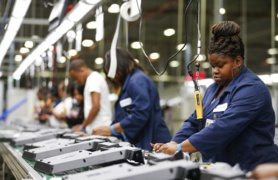Source: People’s Daily
A Chinese manufacturing tycoon’s decision to build factories in the U.S. has sparked fiercedebate among the Chinese public, with many media outlets and scholars accusing China’stax system of crippling the country’s global competitiveness in manufacturing.
In an interview with Yican.com in December, Cao Dewang, the chairman of Fujian-basedFuyao Glass Industry Group, said he planned to spend $1 billion building factories in theU.S., as China’s manufacturing industry is stagnant due to high taxes and rising laborcosts. As the world’s second largest automotive glass supplier, the company has selectedMoraine, Ohio to host its North American after-market automotive glass manufacturing,which is expected to result in 2,500 new jobs.
The hashtag “CaoTalksAboutManufacturing” has garnered over 6 million page views as ofpress time, with many scholars and netizens worried that the China is losing its grip on themanufacturing industry.
Cao is not the first entrepreneur to transfer business abroad. Li Ka-shing, the richestperson in Asia, has been trimming his property portfolio in China since 2011, switching hisfocus to European and other foreign markets.
The decision of Chinese manufacturers to shift focus to foreign markets is widely believedto be connected to severe tax burdens. In addition to a 25 percent corporate income tax,Chinese companies still have to pay other taxes including added-value tax, which can beover 10 percent. For the past decade, tax revenue increases in China have generally beenhigher than the country’s GDP growth rate, according to a commentary published on Dec. 19 by Xiakedao, a public WeChat account operated by People’s Daily.
“Chinese companies have to pay comprehensive taxes of over 50 percent, ranking fourthamong the 21 APEC economies. Technically, after paying taxes, Chinese companies are onthe verge of death,” said Li Weiguang, a professor at Tianjin University of Finance andEconomics.
Apart from high taxes in China, skyrocketing labor and energy costs have also eroded thecountry's competitiveness in manufacturing. According to a report from BCG, a Bostonconsultancy, the cost of natural gas has soared by an estimated 138 percent in China; bycontrast, prices for natural gas have fallen by as much as 35 percent since 2004 in NorthAmerica. BCG projected that by the end of 2018, it will be 2 to 3 percent cheaper tomanufacture products in the U.S. than in China.
Cao’s decision, together with U.S. President-elect Donald Trump’s efforts to bringmanufacturing back to the U.S., have many Chinese experts and entrepreneurs worried. Anumber of scholars have proposed reforming the country’s tax system, as well as loweringenergy costs.
In an interview with Yican.com in December, Cao Dewang, the chairman of Fujian-basedFuyao Glass Industry Group, said he planned to spend $1 billion building factories in theU.S., as China’s manufacturing industry is stagnant due to high taxes and rising laborcosts. As the world’s second largest automotive glass supplier, the company has selectedMoraine, Ohio to host its North American after-market automotive glass manufacturing,which is expected to result in 2,500 new jobs.
The hashtag “CaoTalksAboutManufacturing” has garnered over 6 million page views as ofpress time, with many scholars and netizens worried that the China is losing its grip on themanufacturing industry.
Cao is not the first entrepreneur to transfer business abroad. Li Ka-shing, the richestperson in Asia, has been trimming his property portfolio in China since 2011, switching hisfocus to European and other foreign markets.
The decision of Chinese manufacturers to shift focus to foreign markets is widely believedto be connected to severe tax burdens. In addition to a 25 percent corporate income tax,Chinese companies still have to pay other taxes including added-value tax, which can beover 10 percent. For the past decade, tax revenue increases in China have generally beenhigher than the country’s GDP growth rate, according to a commentary published on Dec. 19 by Xiakedao, a public WeChat account operated by People’s Daily.
“Chinese companies have to pay comprehensive taxes of over 50 percent, ranking fourthamong the 21 APEC economies. Technically, after paying taxes, Chinese companies are onthe verge of death,” said Li Weiguang, a professor at Tianjin University of Finance andEconomics.
Apart from high taxes in China, skyrocketing labor and energy costs have also eroded thecountry's competitiveness in manufacturing. According to a report from BCG, a Bostonconsultancy, the cost of natural gas has soared by an estimated 138 percent in China; bycontrast, prices for natural gas have fallen by as much as 35 percent since 2004 in NorthAmerica. BCG projected that by the end of 2018, it will be 2 to 3 percent cheaper tomanufacture products in the U.S. than in China.
Cao’s decision, together with U.S. President-elect Donald Trump’s efforts to bringmanufacturing back to the U.S., have many Chinese experts and entrepreneurs worried. Anumber of scholars have proposed reforming the country’s tax system, as well as loweringenergy costs.
 Menu
Menu
 Manufacturing tycoon's investment in U.S. sparkes debateover China's global competitiveness
Manufacturing tycoon's investment in U.S. sparkes debateover China's global competitiveness

















